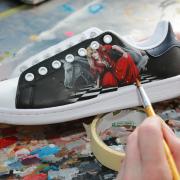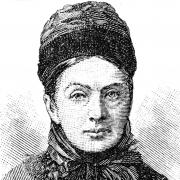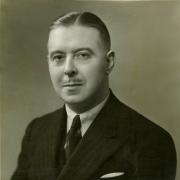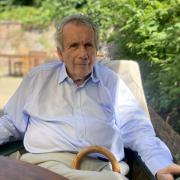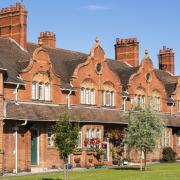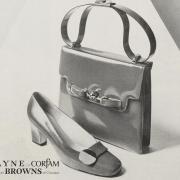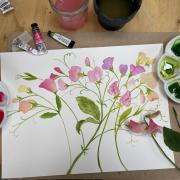If you have ever wondered how it all works in an auction house, meet the team at Wilson55.
Why Wilson 55? The firm previously known as Peter Wilson Fine Art Auctioneers, the longstanding Nantwich auction house, has been rebranded and is under fresh ownership. The updated name pays homage to its heritage – the ‘55’ referencing the fact the company was founded in 1955, by Peter Wilson.
New owner Stephen Sparrow joined the auction house in 2002 and is the company’s art specialist, with a reputation that travels far beyond Cheshire’s borders. But how do you become an ‘art specialist’?
‘I did a history of art degree at Warwick University,’ he says, ‘which is one of those degrees you’re unsure what to do with and, really, finding my way to Wilson55 was a complete accident.’

Stephen had always been interested in antiques – even at university. 'In history of art,' Stephen explains, 'the worst thing you can do is ask any of the professors the value of an item. They hated it, but for me, it had always been an interesting aspect.' It appears, then, that the auction world is the perfect mixing pot of historical value and monetary value.
Following graduation, Stephen investigated working for the National Trust, applying to be a castle steward at Lindisfarne. 'I was applying against retired diplomats,' he says. 'Because of my age, they thought it wouldn’t be fair to put me on a tiny island cut off from the mainland by the tides, so I didn’t get the job.'
This turned out to be a serendipitous decision for Stephen, followed by a second serendipitous decision – to support his sister in her quest for antique teddy bears.
'My sister is a big collector of teddy bears, particularly Winnie the Pooh. She saw some first-edition Winnie-the-Pooh books in an auction catalogue and took me along to the auction. I was fascinated; I got talking to then owner Robert Stones and I was offered a job within the week.’
For Wilson55, the sale of Northern Art is its shining star. 'People realise that to achieve optimum price you only have one chance. You want to sell it in the right place, which for Northern Art is here.
'Success, of course, brings volume,' Stephen says when asked about the importance of a good reputation in the auction business. With the continuing success of Wilson55’s Northern Art and other art sales, 'the number and value of quality artworks we take in and sell is just going from strength to strength.'
Northern Art – artworks created by artists from the north of England, typically depicting stereotypical northern scenes – don’t, as perhaps might be expected, sell as well in London showrooms, no matter how well-known the auction house is. 'You want to sell your picture at the place it’ll do the best,' Stephen says. 'I’ve had experts from London sending me up their northern art to sell because we achieve the strongest prices, which is pretty flattering.'

Ultimately, a successful auction house relies on its specialists to build its reputation and bring in clientele. Their team – although small – consists of experts in the worlds of jewellery, guns, toys, wines, ceramics, coins, and fine furniture, to name a few. It is essential to choose an auctioneer with a good reputation in the area you’re looking for. You can trust them to give you an accurate valuation, to know what they’re doing and, at Wilson55, be there every step of the way, from when it is first valued to when it is sold at auction.
Auction diary
Most auction houses run at least one auction each month, some of which are specialist and some of which are more general, capturing a wide range of antiques and ephemera to offer for sale.
Stephen explains that each specialist has total responsibility for all the goods in their category coming in. This includes valuation appointments, external appointments (home visits), photography, and the creation of condition reports. Condition reports are produced for every single item being placed for sale and is a formal document provided by the auctioneer describing the appearance and quality of the item in detail, so the potential bidders know precisely what they are bidding for. Buyers can request information or additional photographs too, so they feel wholly comfortable placing their bid. The catalogue, with small descriptions of each lot, is put online three to four weeks prior to the sale, and items are added as and when they come in right up until the sale day.

The traditional view of an auction house is of a large auditorium, a man shouting out the bid values, buyers waving their paddles and the gavel banging after every sale. At Wilson55, however, everything is undertaken online. This includes the catalogue and the sale, which is live streamed to buyers who have pre-registered with their details and are then able to make their bids. Wilson55 also accepts telephone bidding, again from pre-registered buyers. Those interested in selling items can also request online valuations for free if they don’t wish to travel for an in-person valuation, and then arrange for their items to be collected or delivered. In-person viewings of the items going on sale only happen – typically – the week of the sale itself. This is when local buyers, new faces and professional buyers come into the saleroom, where the lots are laid out for inspection and the specialists are on hand to answer any questions.
Sale day
During Wilson55’s online auction, specialists will auction off the items in their own category. 'It’s nice to see the items from start to finish,' specialist Liz Bailey, says. 'It’s more satisfying when you’re selling your own items because you know the history. It also helps you get that bit more out of bidders.'

'The first big item I sold,' she says, ‘was a 10-carat diamond, and it went for £60,500. It came with a really outdated insurance certificate which said that it was worth £20,000, so when I told them it was going to be more like £40,000-£50,000, the owners were thrilled.'
For Liz, it seems to be the nice surprises that count. 'I like the things people don’t know they’ve got. Bits I find in boxes of costume jewellery. When you’ve had a good root around and picked it out, it’s quite satisfying.'
After the sale
Immediately after the last item is sold, invoices start to go out to the buyers. At Wilson55 sales typically take place on a Thursday and on the following day items can be collected. Liz likes to pack up all the goods, print out invoices, contact vendors and pair items up for buyers as soon as she can, so she can start Monday with a fresh start for the next sale.
On occasion, specialists will get inquiries after the sale about items that didn’t sell from people who are interested in buying. It doesn’t happen often, however, because Wilson55 has an excellent sale rate. In Liz’s time at Wilson55, she’s seen two ‘White Glove’ sales, in which all the items auctioned are sold, and a few that came extremely close.
Specialist corner
Liz Bailey
Liz Bailey is Wilson’s specialist in Jewellery, Watches, Silver and Designer items. It appears Liz hadn’t always planned to enter the auction world either, as she studied English at Leeds University. It was during her final two years of study that she developed an interest in antiques. 'I started going to antique fairs and National Trust properties,' Liz says. 'I also started visiting local auction viewings, which introduced me to the career.'

Chris Large
Chris Large has been at Wilson55 since he was 14 years old – he had indeed already been a member of the team for a few years before Stephen joined the business. He specialises in Firearms, Weapons and Military Medals, and, disparately enough, Ceramics and Musical Instruments.

Chris stresses the importance of loving what you do. 'Ask yourself what you would collect if you didn’t have to work,' Chris says when asked what advice he’d give to those starting out. 'Specialise in that.'
Chris collects guns. He also specialises in them. 'I always knew I wanted to work with guns,' he says. At school, he would spend his time in the design and technology classrooms, putting together gun parts made of wood to show his teachers. After hoping to spend his work experience at the local gun shop but being told he was too young, he went to Peter Wilson, where he could work with antique guns.
What is perhaps most interesting about Chris’ fascination with this specialism is that he is anti-war and does not take part in hunting. The only time he ever shoots a gun is for target practice. He’s simply fascinated by the way they work, and their history.
He lives by his own advice, working with his hobby every day.








